Stagecoach was the first John Wayne movie I saw when I was a kid and it remains my favorite of any of his films. Revisiting it this week left me amazed by how much Stagecoach manages to grow with you. Filled with a fine supporting cast, each of whose other work has become more familiar to me in the intervening years, it’s all the more impressive that no matter what age I watch Stagecoach John Wayne’s Ringo Kid still towers above them all.
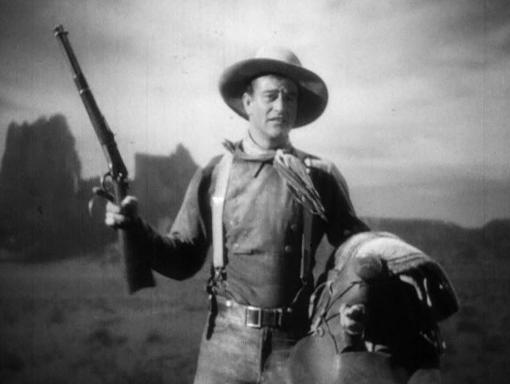
It’s still my favorite screen entrance. We’ve heard a bit about him, but we don’t meet the Ringo Kid until over 18 minutes into the movie. It looks the same every time, no surprises anymore, but it still gets a rise out of me. The camera catches Ringo from afar, makes a shaky approach that confuses to a blur before sharpening close upon his facial features. No matter how many times you’ve seen it that brief blur delivers a beat of anticipation knowing that once he comes into focus he’s going to remain the focus. Credit John Ford for the style; credit John Wayne for sheer presence. It is one of those screen moments I wish I could go back and enjoy for the first time all over again.

Ringo stands defiant yet quickly reveals himself to be down to earth, polite, even conscientious. All around charming. Character is the character’s strength, all the more so when you remember that Ringo is an escaped convict on a mission of vengeance. Ringo’s brother and father were killed by badman Luke Plummer and his brothers. Now Ringo wants Plummer. George Bancroft’s Curley immediately puts Ringo under arrest, but from the second Ringo joins the others you know they’re going to need him. You also know that there’s nothing that could possibly restrain him from evening the score with the Plummer boys.
Nothing but Claire Trevor’s Dallas, a prostitute riding the stage to Lordsburg after being driven from town by the women of high society. How Trevor couldn’t get an Oscar nomination in 1940 can only be explained with a shrug of the shoulders and quiet mention of 1939, commonly held up as the movies’ greatest year. Stiff competition.

What I forgot about Stagecoach until watching again this week, perhaps being too involved with Ringo to have ever even noticed before, is Trevor’s stunning performance. The woman is broken and her fractured state causes her to really take society’s scolding to heart. Her past keeps her from looking others in the eye when she speaks. She’s used to scorn. So when Ringo treats her like a lady, just as much a lady as the respectable Mrs. Mallory (Louise Platt), Trevor’s Dallas is so overwhelmed that her replies come in a quiver. Her shaky voice almost breaks you. You long to comfort her. Thankfully Ringo is there. Her eyes light up at his innocent defense of her. Ringo calls her “ma’am” and “Miss Dallas” while the others, excepting Doc (Thomas Mitchell), do their best not to speak to her at all.

What I hadn’t remembered about Stagecoach was that besides the incredible collection of characters, the breathtaking shots of Monument Valley, and beyond the rousing shoot ’em up action is, thanks to Trevor, a touching love story that stands out above all those other masterful ingredients.
Stagecoach was based on the Ernest Haycox short story “Stage to Lordsburg,” which was brief enough to appear in its entirety inside just one edition of Collier’s Magazine. That April 10, 1937 edition of Collier’s is a heck of a find for classic movie fans as not only does it include the basis of Stagecoach but Hagar Wilde’s short story “Bringing Up Baby” as well!
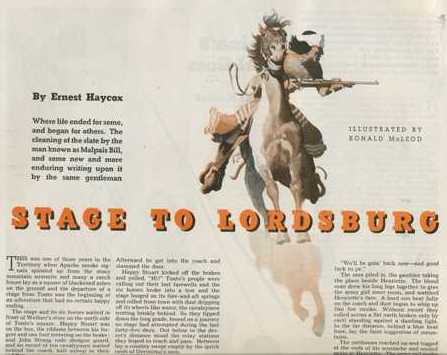
Stage to Lordsburg by Ernest Haycox as it appeared inside the April 10, 1937 edition of Collier’s Magazine.
John Ford spent $2,500 for the rights to Haycox’s story and then unsuccessfully shopped it around until Walter Wanger wisely bit. Wanger wanted Gary Cooper and Marlene Dietrich to play Ringo and Dallas, but Ford wisely preferred to spread his budget over more talent to fill out the cast. Thankfully so as it is now hard to imagine anyone but these recognizable faces in each of Stagecoach’s roles.
For as great as John Wayne and Claire Trevor are we also have Thomas Mitchell, who did win an Academy Award for Best Supporting Actor in his part of the drunken Doc; The menacing John Carradine, dressed in black with a past to match as Hatfield; Andy Devine doing his usual delightful croaking as stagecoach driver, Buck; experienced and somewhat haggard looking George Bancroft as the Marshall, Curley, riding shotgun alongside Buck; Louise Platt looking as fragile as porcelain as the beautiful Lucy Mallory in search of her cavalry husband; the so properly named Donald Meek as Peacock, the quiet whiskey salesman who everyone confuses for a clergyman; and Berton Churchill as the shifty banker Gatewood who’s playing just the part that pre-code fans would expect of him.
Leaving the love story behind Stagecoach is still a gripping action film with layers of suspense that are continuously fulfilled.
From the start, well before we even meet Ringo, there’s the threat of Geronimo and the Apache. It saddles the Cavalry, led by young Tim Holt, alongside Buck’s stage for the first part of the journey and is the prime threat to all throughout Stagecoach.
Once Ringo joins the others the looming threat of his own one-on-one showdown begins to take over as prime concern of the audience. Why? Because we care so much about Ringo and it has been established that Luke Plummer (Tom Tyler) is a better shot than he is. And even if he isn’t he has two brothers to more than shift the odds in his favor.
As we become more involved with the Ringo Kid and Dallas we become more concerned about the threat of the Plummers. Of course, just as the Plummers loom as the sole threat in our minds the Apache send out war signals and we’re sucked back into the lives of all our other interesting friends.
John Ford’s Stagecoach premiered in Los Angeles, February 15, 1939 before going into general release that March. It was an immediate critical and popular success and continues to be so.
While a legendary collection of leading ladies may have kept Claire Trevor from an Oscar nomination in 1940, Stagecoach fared pretty well as a whole receiving seven Academy Award nominations in total, including Best Picture and Best Director, and winning two, Mitchell’s for Supporting Actor and another split four ways for its score.
I don’t usually cover the really big movies like Stagecoach. It seems like everyone has seen it and everything has been written about it. But I do know there are people with a bias against Westerns. I know it personally through various friends and family. Stagecoach is delivered as a Western, sure, but forget about genre here. Anyone who loves rich characters and a poignant love story, and can withstand a bit of action along the way, will find something to love about Stagecoach.

[phpbaysidebar title=”John Wayne on eBay” keywords=”John Wayne” num=”5″ siteid=”1″ category=”45100″ sort=”StartTimeNewest” minprice=”59″ id=”2″]

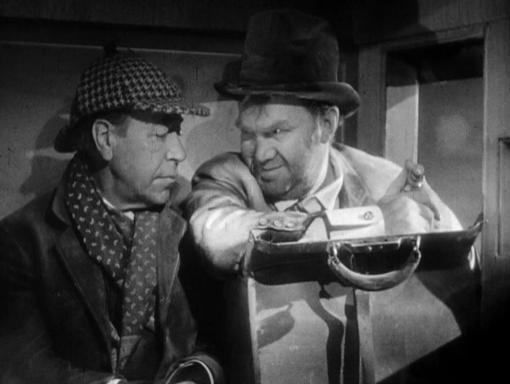
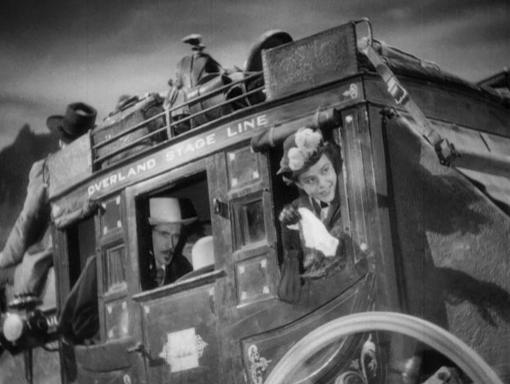
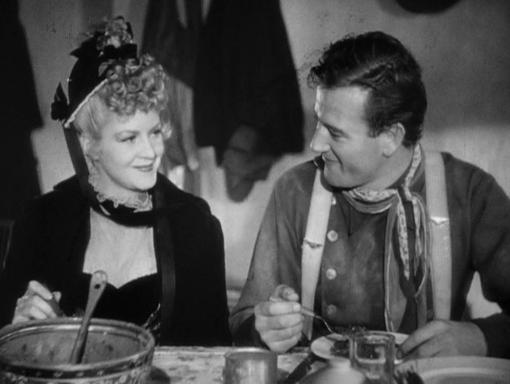

It’s been waaaay too long since I’ve seen this. AM setting my PVR right now!
You’ve got a half hour! I already know I’ll come back to it sooner than I had last time after this viewing. Enjoy!
Stagecoach is a fantastic movie. I’m not a huge fan of westerns or Wayne, but I can’t find a damn thing wrong with this movie.
Excellent piece, Cliff.
I’m with you, Jill, Not a huge Wayne fan and as for Westerns I only like the best known ones. Even a few of those don’t thrill me. But Stagecoach, perfect!
Great post!
How can you NOT be a big fan of westerns?
I know you love gangster films. Aren’t you are of what Jean-Pierre Melville said about gangster movies really being westerns?
Sure, the ten-gallon hat has become a fedora, the wide open desert has become a dark street corner, the trench coat has replaced the leather vest, the cigarette has replaced the cigar, the shadowy night has replaced the bright sunlit day … but the gangster is the urban cowboy. The lone hero, operating according to his Code – Western heroes have their code, and so do gangsters. The lone hero, the outcast from society, upholding their personal code …
Jean-Pierre Melville, who made some of the greatest French crime films, always wore a big Stetson hat. Sergio Leone, who made some of the greatest Westerns ever, then went on to make the great gangster movie ONCE UPON A TIME IN AMERICA.
Many of these gangsters share the same rituals of the cowboy. Melville’s gangsters had a code and a style no different than the characters played by John Wayne or Clint Eastwood.
What I’m saying is … you should check out all the classic Westerns. Not just the very famous great ones. But all of ’em.
It’s just such a shame when I see decent folks, fans of the gangster movie, who haven’t yet been able to appreciate the Western in the same way. Such a pity …
Let me put you on a little program here … only because I care 😉 :
Watch the four really good Budd Boetticher westerns: “Seven Men from Now,” “The Tall T,” “Ride Lonesome,” and “Comanche Station.” These are very short – none more than an hour and fifteen minutes.Lemme know when you’re done.
And watch Sergio Leone’s Westerns, and when you are done, read Christopher Frayling’s marvelous biography “SERGIO LEONE: SOMETHING TO DO WITH DEATH.”
I’m assuming you’ve seen the famous John Ford and Howard Hawks Westerns, but if you haven’t, make sure to at least see “My Darling Clementine,” “Fort Apache,” “Red River,” and “The Man Who Shot Liberty Valance.”
one day you’ll thank me 😉
Hi Steven,
Your list at the bottom — Own ’em all, seen ’em all, like a lot of them. Maybe I just don’t like crappy Westerns and singing cowboys 🙂 I’d watch ANY gangster flick, and if I’m missing out on singing mobsters, do let me know.
I’m not huge on the Boettichers, find them overrated. Like a lot in the genre there’s an emphasis placed on the visuals and stunning camera shots over action, sometimes story, and almost always pacing. Same with Ford. I don’t particularly care for the director to put such a huge mark on their films, I find it egotistical and distracting. That said, I love both Leone “Once Upon a Time” flicks, especially in the West. Any time that one threatens to lull me off the soundtrack interrupts to give me goose pimples. You named three of my favorite Ford westerns (though I still prefer his non-Westerns). The fourth, Liberty Valance, I find over-reliant on its twist and story structure and have never found it as rewarding as it was after the first time I watched it. I know, much of this reply is sacrilege, but I think it informs quite a bit as to my tastes, which I’m happy to admit may be considered bad by some.
Actually, most of those titles that you named I’d class in the “big” Western category that I’m familiar with, the stuff I skip over is generally the ’30s “b” grade and serials, and all those ’50s cowboy and Indians shoot-em-ups.
Cliff
In that case, I guess you are more of a Western fan than I thought – maybe even more than YOU thought 😉
Being a Western fan doesn’t mean seeing those crappy poverty-row Westerns from the 30’s – like the numerous ones John Wayne was in (I’ve only see one of those), those 5-day westerns or whatever they call ’em. And I’ve virtually never watched a singing cowboy movie.
For me, being familiar with all the greats is enough to make you a Western fan.
I hope you’ve seen Leone’s “Dollars trilogy,” too.
I am a huge fan of “Liberty Valance,” I don’t think anything is dependent on “the twist,” it’s just such a great movie to watch. And it sorta turns on its head the Ford themes we’d been used to seeing 😉
Another Western I like very much is “The Far Country.” I’m not a huge fan of the Stewart-Mann Westerns, I think “Winchester ’73” is way overrated, but “The Far Country” is a movie I love.
I will grant you that a bad gangster movie is probably easier to watch than a bad western, but I don’t watch bad westerns. I try to only watch good movies 🙂